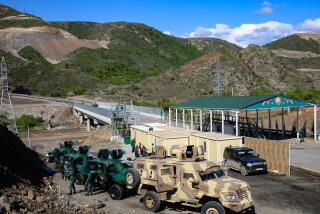Baker Sees Hope of Ending NATO Missile Dispute
WASHINGTON — Secretary of State James A. Baker III indicated Friday that the United States may ease its objections to East-West negotiations on short-range nuclear missiles, opening a way to solve a dispute that has divided the Atlantic Alliance.
Baker, winding up a weeklong, 15-country journey that began in Canada and then ranged across Europe, said his discussions with allied leaders made it clear that they oppose the total elimination of the battlefield missiles, as does the Bush Administration.
As a result, Baker said, the Administration’s concern that pressure could build for the abolition of short-range missiles--an idea U.S. military strategists oppose--has eased.
Solution Seen by May
“I happen to think that we will see this problem solved before the May NATO summit in Brussels,” Baker told reporters traveling with him from Paris to Washington at the end of his trip.
The question of what to do about the North Atlantic Treaty Organization’s short-range nuclear missiles--battlefield tactical weapons with a range below 300 miles--has been under discussion for years, but became a point of friction in recent weeks between the United States and West Germany.
The Bush Administration wants to build a new, more modern version of the existing Lance missile. In West Germany, though, where most of the short-range weapons are deployed (and where they are most likely to be used in a war), polls have found large majorities in favor of getting rid of the missiles.
Most NATO military planners believe that abolishing the missiles would leave Western Europe without a credible deterrent to the Soviet Union’s large conventional army. Abolition of the missiles is known in military jargon as the “Third Zero Option,” the other two referring to the elimination of two categories of ground-launched intermediate-range missiles under a 1987 U.S.-Soviet agreement.
But domestic political pressures prompted West German Chancellor Helmut Kohl to declare himself fully in favor of negotiations to reduce the number of short-range missiles, although he added that he did not favor reducing them to zero until a new East-West balance of conventional armed forces is achieved.
The apparent division over the issue was all the more painful, officials said, because of their common perception that Soviet President Mikhail S. Gorbachev has seized the initiative in East-West relations through his unilateral withdrawal of some Soviet army troops from Europe.
U.S. and West German officials acknowledged that they were at odds over the issue. But Kohl’s declaration that he rejects the Third Zero, along with the upcoming opening of talks on conventional armed forces in Europe, opened the way for a possible compromise, they said: NATO can declare itself open to short-range negotiations if there is progress in the conventional talks and formally rule out the Third Zero at the same time.
Baker refused to say what kind of compromise he foresees before the May summit.
“It’s premature to talk about where we might ultimately come out,” he said.
No ‘Great Schism’
But he said he saw no “great schism” between the United States and West Germany on the issue of short-range missile negotiations.
And he noted that the Europeans had reassured him on the very issues which led the Administration to oppose negotiating over short-range nuclear forces, or SNF.
“We did not think that commencing negotiations on the SNF was advisable because of the questions that it would raise with respect to the Third Zero, with respect to forward defense, with respect to flexible response,” he said, referring to NATO’s basic military doctrines. “What I found interesting on this trip was the firm commitment in every one of these countries to the principles of no Third Zero, forward defense, and flexible response.”
Still, a senior official aboard Baker’s plane said, the alliance has some internal negotiating to do before a compromise on the issue is struck.
“We’ve got three months before the summit,” he said. “There’ll be a lot of discussions.”
But Baker’s trip has improved the chances for an early resolution, in part because it appears to have given the secretary of state a more concrete sense of the political pressures on Kohl’s government.
“We do need to balance the needs of the Europeans, and their political concerns, against the needs that we have to assure the Congress that if they fund this program, that it will go forward,” Baker said.
At the same time, he said, the West Germans understood more clearly that the Bush Administration needs a clear signal that European countries will agree to deploy the new missiles if Congress is to provide the money to build them.
Foreign Minister Hans van den Broek of the Netherlands has volunteered to mediate among the NATO members to help find a joint position before the May summit meeting. The deadline of the summit, which President Bush and other Allied leaders are scheduled to attend, has thus become a clear test of NATO’s ability to arrive at a common position and offer some initiatives of its own to counter Gorbachev.
Baker’s grueling itinerary sent him whirling through all 15 of the United States’ NATO allies in a single week--Canada, Iceland, Britain, West Germany, Denmark, Norway, Turkey, Greece, Italy, Spain, Portugal, Belgium, Luxembourg, the Netherlands and France--sometimes at a pace of three per day.
For Baker, the journey provided a first-hand, if abbreviated, look at a Europe in which Gorbachev’s initiatives have called the political structure of 40 years of the Cold War into question as never before.
“I think what we’ve learned is that the alliance is strong even in times of transition,” he said. “We see now a transition in terms of the threat perception. . . . And the alliance, based on what I have heard during this trip, remains strong.”
More to Read
Sign up for Essential California
The most important California stories and recommendations in your inbox every morning.
You may occasionally receive promotional content from the Los Angeles Times.











